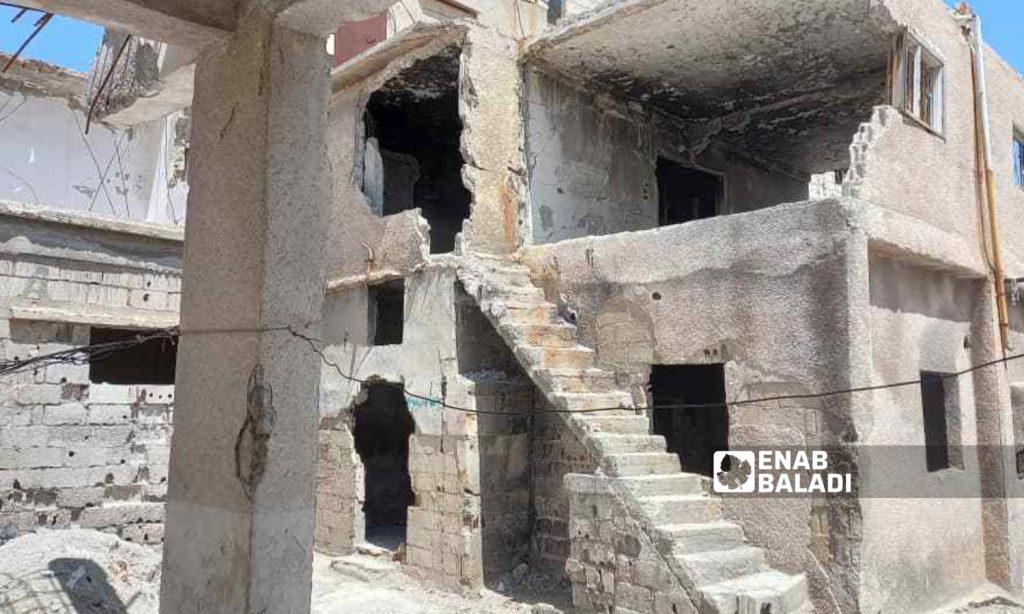Daraa – Halim Muhammad
The United Nations Relief and Works Agency for Palestine Refugees (UNRWA) signed in April to rehabilitate 110 homes in the Daraa camp for Palestinian refugees in southern Syria.
The restoration process will begin gradually for specific homes that were selected based on field studies.
Fayez Abu Eid, the head of the media department in the Action Group for Palestinians of Syria (AGPS), told Enab Baladi that UNRWA chose the central neighborhood of the camp to start the restoration process, provided that the project would gradually extend to the rest of the camp’s neighborhoods.
According to Abu Eid, a specialized UNRWA committee recently visited 110 homes in the camp, assessed the extent of the damage, and then signed the contracts.
Accusations of nepotism
Youssef, 55, (refused to reveal his full name for security reasons), a construction worker, told Enab Baladi that UNRWA renovated his house in Daraa camp in 2021 by adding doors and windows, building a wall, and renewing sanitary and electrical installations.
While Youssef succeeded in obtaining the restoration, UNRWA refused to include the house of Mohammad, another resident of the camp, in the restoration plan.
Mohammad (refused to reveal his full name for security reasons) told Enab Baladi that the UN organization’s justification was that the house was in the name of his deceased father and not in his own name, so he will have to restore it at his own expense.
Regarding the costs of restoration, Mohammad stated that each door or window costs no less than 500,000 Syrian pounds, in addition to the costs of repairing the sanitary facilities in the house.
For his part, Abu Eid, the official of the AGPS media office, stated that the restoration project faced criticism from some refugees, who accused the agency of “favoritism and nepotism in choosing beneficiaries” and depriving the families who returned to the camp of their right in the restoration, in favor of houses located outside the borders of the camp.
Restoration conditions
UNRWA has not started disbursing the financial dues to renovate the houses despite the signing of the contracts, according to Enab Baladi’s correspondent in Daraa.
The organization determines the value of the amounts based on a physical examination of the damaged homes, and these amounts are mentioned in the contract concluded between the beneficiary and the organization, and the beneficiary undertakes to contract with special workshops for restoration.
The “field inspection” is an engineering team’s visit to the damaged building site, assessing the damage, and allocating an amount sufficient to restore the damaged parts.
The reporter stated that the organization is excluding the very damaged buildings from the restoration operations.
The number of family members also plays a role in the amounts paid, as they are linked to the number of rooms, according to the AGPS.
Securing shelter
The number of Palestinian families who returned to Daraa camp after the 2018 security settlement that took place between the Syrian regime and factions of the Syrian opposition is estimated at about 700 Palestinian families, said the AGPS.
Abu Eid told Enab Baladi that UNRWA’s latest step contributes to securing shelter for most of the camp’s residents whose homes were damaged.
Despite the importance of the step for the camp residents, there are concerns about the “slow implementation process.”
Abu Eid indicated that if the pace of implementation remains the same, the restoration will take a long time until it is completed.
UNRWA has already renovated 60 homes out of the hundreds of homes that need restoration during the years 2020 and 2021.
The camp’s residents suffer as a result of the deterioration of services and the high cost of living, as well as the organization’s and Daraa governorate’s neglect of paving roads, the accumulation of rubbish, and the spread of stagnant water in the alleys and streets of the camp.
Previous protests
Last March, dozens of residents of Daraa camp protested in front of the UNRWA headquarters against the organization’s policy of supporting the Palestinians in the financial and relief fields.
UNRWA has been facing a funding crisis since 2021, which is undermining its efforts to provide humanitarian and human development support to some of the world’s most vulnerable refugees.
Philippe Lazzarini, Commissioner-General of UNRWA, warned in February 2022 that the unstable situation in funding the organization leads to “an increase in despair, distress, and frustration” in the Palestinian camps, especially in Lebanon, Syria, and Gaza.

